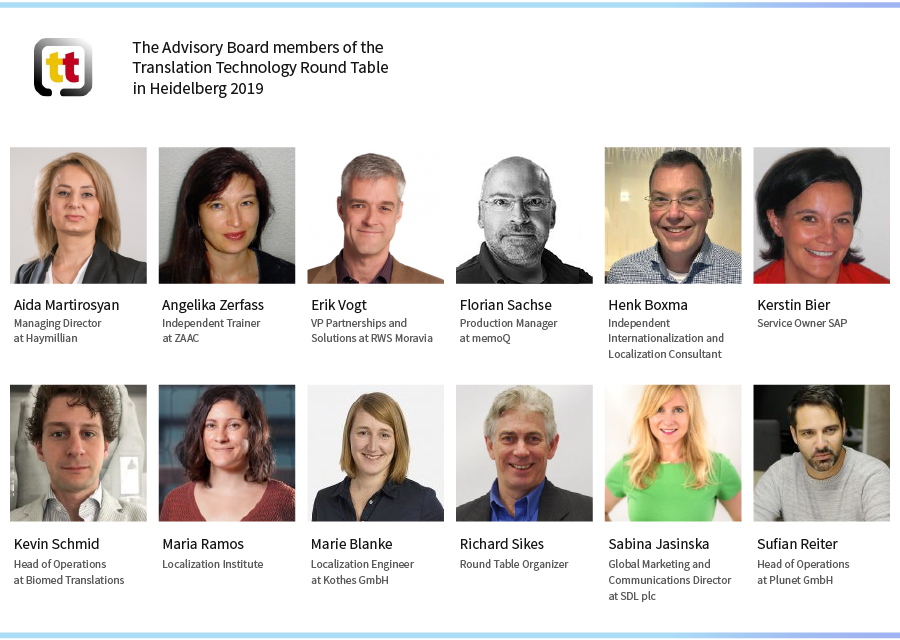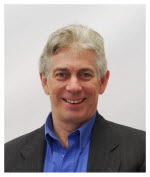After two successful Translation Technology Round Tables organized by the Localization Institute in the USA, the third edition of the industry event is taking place for the first time in Europe. On September 19-20, technology suppliers, translation buyers, and industry experts will meet in the German university city of Heidelberg in order to talk about the latest developments in the field of translation technologies. The agenda includes six sessions plus one optional session spread over two days. The sessions are loosely structured and start with a short presentation followed by a detailed discussion round with all attendees.
We spoke to Richard Sikes, organizer of the event and industry veteran, about how this event was conceived and the focus of it.
This is the first time that the Localization Institute is organizing a Translation Technology Round Table in Europe. Why did you decide to have an event in Europe after two Round Tables in the USA and why in Heidelberg?
Both Round Table events that we held in North America were filled to capacity. At those events, we had participants who traveled from Europe, South America, and even Singapore to participate. For that reason, we thought that it would be worth trying to hold an event in Europe.
We chose Heidelberg for several reasons. It is central in Europe and easy to get to from Frankfurt airport by train. Also, we have used the Qube as a venue for other similarly sized events, and have had a positive experience. Finally, Heidelberg is simply a very nice place to visit for a couple of days. It is interesting to note, however, that two of the previous participants in the North American Round Tables are traveling from the USA to Heidelberg to attend even though we’ll have another one in the USA in January.
If you look at the translation industry and its latest topics, what are the differences that you encounter between Europe and the USA?
The one big difference is the Standards topic. This topic has been proposed before for the North American Round Tables, and the Advisory Board for those events has prioritized other topics so it was not included. The Advisory Board for Heidelberg has several members who have strong feelings about the value of standards (both positive and negative), and they voted to include it. Otherwise, the topic coverage for the main Round Table is pretty much the same.

But we’re trying one other new idea in Heidelberg. We’re holding an optional session at the end of the second day. This session deals with how technology is marketed. This is a topic that keenly interests me and one other member of the Advisory Board, Sabina Jasinska. Given that many translation technologies do much the same thing, we are curious to explore how providers choose to differentiate their products. We are hopeful that a few attendees from the buyer side will remain for the session and speak out about what resonates with them when considering a technology acquisition.
Regarding the size of the event, how will the Round Table in Heidelberg differ from the last one in Boulder, Colorado, at the beginning of this year?
The Heidelberg Round Table will be somewhat smaller in size. In Boulder, we had about 35 attendees and a waiting list. The Qube space is full at around 25 participants. This is not problematic because the European event is an experiment. Furthermore, we have determined that when we exceed about 30 participants, the Round Table loses some of its informal ambiance that makes it a special experience. So, greater attendance has diminishing returns. We learned that from the Boulder event.
The focus of the Round Table is always on information-sharing. The moderators strive to encourage dialogue, idea interchange, point, and counterpoint.
Allow us a glimpse behind the scenes: How does the organizational process of an event like this work, from the idea to the realization?
The first thing that I do is recruit an Advisory Board. The Board comprises experienced industry professionals who are deeply involved with translation technology. To get the broadest range of topics possible, I strive to achieve an equal mix of Board members from the technology buyer side and supplier side. Forming a knowledgeable Board is a crucial step because they suggest the topics. I was very happy to have a senior member of the Plunet staff, Sufian Reiter, as one of the Advisory Board members. Sylvester Weise, another Plunet employee based in New York, has served on the Advisory Board for the USA Round Tables for both years and will be joining the Board again for the January 2020 Round Table in California.
Then we hold two or three online brainstorming sessions to create a list of topics. These brainstorming sessions can get very lively, which is wonderful because it sets the overall tone of communication and sharing that gets transferred forward into the actual event.
For Heidelberg, we came up with about 40 suggestions. These were listed in an online spreadsheet. We have a voting method whereby each Advisory Board member can prioritize their choices by distributing points. After aggregating the scores, the trends are clear. Some suggestions are related, so they can be amalgamated. In this way, we shape the original 40 suggestions into just five topic areas that become the agenda, whereby I have final say of what gets included.
We purposely leave the sixth topic unplanned so that the attendees can choose it during the Round Table. This open topic sometimes serves as a “spillover” session if one of the planned topics needs more time. Or, sometimes ideas for discussion emerge spontaneously during the planned sessions, and the group decides to use the open topic time to address them.
After defining the topics, we can begin by promoting it. This is done through the Localization Institute and with helpful industry partners like Plunet. Shortly before the Round Table, we hold one final Advisory Board to ensure that everyone is aligned and comfortable with the topic of moderation with which they have been assigned.
At that point, it is “all systems go!”
What do you wish as the outcome of the event?
If every person who attends – including those who are long-time industry veterans – leaves with the feeling that they have learned something new that made their time spent there worthwhile, my deepest wish for the Round Table will be fulfilled.
There are still a few places available. Register online via the Localization Institute website.
LocFlowTech founder Richard Sikes has been immersed in technical translation and localization for over 30 years and has managed localization teams for several industry-leading software companies. He is a well-known speaker at translation industry events as well as a frequent contributor to MultiLingual magazine. Richard is closely associated with Content Rules, performing global content quality reviews, and with memoQ, where he performs Solution Architecture services.
